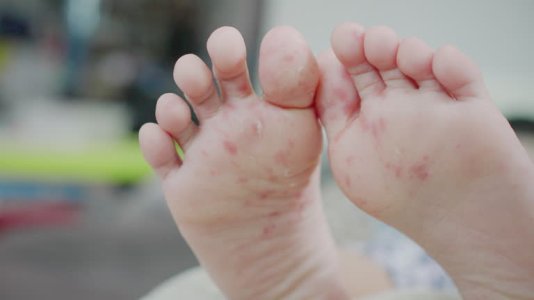Is your state next? NYC braces for a second highly contagious virus as cases surge nearby
- Replies 0
As if New York City didn’t have enough on its plate, the Big Apple is now bracing for a second wave of trouble—this time, it’s not just Legionnaires’ disease making headlines.
A fast-emerging viral infection is sweeping through the city and threatening to spill over into neighboring states, raising concerns for families, schools, and anyone who spends time around young children.
Experts urge the public to stay informed as the situation continues to evolve.
What’s happening?
While NYC is still reeling from a Legionnaires’ outbreak that’s already infected 67 people and claimed three lives, doctors—especially in Staten Island—are sounding the alarm about a sharp uptick in HFMD.
This highly contagious viral illness is notorious for causing painful sores on the hands, feet, and inside the mouth, along with fever and sore throat.
If you’re picturing a minor rash, think again: for little ones, HFMD can be a miserable experience, and in rare cases, it can even lead to serious complications.
Why the sudden surge?
HFMD isn’t new, but the current spike is raising eyebrows among pediatricians. Dr. Edith Bracho-Sanchez at Columbia University Irving Medical Center says she’s seen more cases in the past few weeks than in the last ten years combined.
And it’s not just a New York problem—Dr. Natasha Burgert, a Kansas-based pediatrician and national spokesperson for the American Academy of Pediatrics, reports a similar trend nationwide.
So, what’s behind the surge? Experts point to a perfect storm: summer camps, pools, theme parks, and the start of the school year all bring kids together in close quarters, making it easy for viruses to hop from host to host.
Add in the warm, humid weather (which helps the virus survive longer), and you’ve got a recipe for rapid spread.
Who’s at risk?
HFMD mostly targets children under 10, with those under five being especially vulnerable.
The good news for most adults is that our immune systems are usually strong enough to fend off the virus. However, immunocompromised adults and caregivers should still be cautious—no one is completely immune.
How does HFMD spread?
This isn’t a virus you can just “walk off.” HFMD is caused by coxsackievirus 16 and spreads through:
Just this July, a Philadelphia water park had to close for a day after a child contracted HFMD there. If the water isn’t properly treated, the virus can linger and infect others.
Also read: This once-wiped-out virus is making a dangerous comeback—and health officials say the risk is real
What are the symptoms?
HFMD usually starts with a fever, sore throat, and sometimes vomiting.
Within a day or two, those telltale red spots and blisters appear on the hands, feet, and inside the mouth.
Most cases clear up within 7–10 days, but for very young children, the illness can be more severe. In rare cases, it can lead to seizures or inflammation around the brain.
How common is it?
Estimates suggest that 10 to 15 million cases of HFMD occur in the U.S. every year, mostly among children under five.
The Centers for Disease Control and Prevention (CDC) doesn’t track HFMD cases specifically, so the real numbers could be even higher.
Also read: Rare virus expands to new regions, prompting global health warning
What should you do if your child gets sick?
There’s no vaccine or specific treatment for HFMD, but you can help your child feel better by:
While there’s no magic bullet, you can lower your family’s risk with some simple steps:

Have you or your family dealt with hand, foot, and mouth disease? Do you have tips for soothing little ones or preventing the spread? Or maybe you have questions about how to keep your household healthy as these outbreaks continue?
A fast-emerging viral infection is sweeping through the city and threatening to spill over into neighboring states, raising concerns for families, schools, and anyone who spends time around young children.
Experts urge the public to stay informed as the situation continues to evolve.
What’s happening?
While NYC is still reeling from a Legionnaires’ outbreak that’s already infected 67 people and claimed three lives, doctors—especially in Staten Island—are sounding the alarm about a sharp uptick in HFMD.
This highly contagious viral illness is notorious for causing painful sores on the hands, feet, and inside the mouth, along with fever and sore throat.
If you’re picturing a minor rash, think again: for little ones, HFMD can be a miserable experience, and in rare cases, it can even lead to serious complications.
Why the sudden surge?
HFMD isn’t new, but the current spike is raising eyebrows among pediatricians. Dr. Edith Bracho-Sanchez at Columbia University Irving Medical Center says she’s seen more cases in the past few weeks than in the last ten years combined.
And it’s not just a New York problem—Dr. Natasha Burgert, a Kansas-based pediatrician and national spokesperson for the American Academy of Pediatrics, reports a similar trend nationwide.
So, what’s behind the surge? Experts point to a perfect storm: summer camps, pools, theme parks, and the start of the school year all bring kids together in close quarters, making it easy for viruses to hop from host to host.
Add in the warm, humid weather (which helps the virus survive longer), and you’ve got a recipe for rapid spread.
Who’s at risk?
HFMD mostly targets children under 10, with those under five being especially vulnerable.
The good news for most adults is that our immune systems are usually strong enough to fend off the virus. However, immunocompromised adults and caregivers should still be cautious—no one is completely immune.
How does HFMD spread?
This isn’t a virus you can just “walk off.” HFMD is caused by coxsackievirus 16 and spreads through:
- Airborne droplets (coughing, sneezing)
- Direct contact with blisters or bodily fluids
- Touching contaminated surfaces (think toys, doorknobs, or playground equipment)
- Swallowing contaminated water (watch out for those public pools and water parks!)
Just this July, a Philadelphia water park had to close for a day after a child contracted HFMD there. If the water isn’t properly treated, the virus can linger and infect others.
Also read: This once-wiped-out virus is making a dangerous comeback—and health officials say the risk is real
What are the symptoms?
HFMD usually starts with a fever, sore throat, and sometimes vomiting.
Within a day or two, those telltale red spots and blisters appear on the hands, feet, and inside the mouth.
Most cases clear up within 7–10 days, but for very young children, the illness can be more severe. In rare cases, it can lead to seizures or inflammation around the brain.
How common is it?
Estimates suggest that 10 to 15 million cases of HFMD occur in the U.S. every year, mostly among children under five.
The Centers for Disease Control and Prevention (CDC) doesn’t track HFMD cases specifically, so the real numbers could be even higher.
Also read: Rare virus expands to new regions, prompting global health warning
What should you do if your child gets sick?
There’s no vaccine or specific treatment for HFMD, but you can help your child feel better by:
- Giving over-the-counter pain relievers (like acetaminophen or ibuprofen) for fever and mouth pain
- Encouraging plenty of fluids to prevent dehydration (mouth sores can make swallowing tough)
- Keeping your child home from school, daycare, or playdates for at least seven days to avoid spreading the virus
While there’s no magic bullet, you can lower your family’s risk with some simple steps:
- Wash hands frequently, especially after using the bathroom or changing diapers
- Disinfect toys, surfaces, and shared items regularly
- Remind kids not to share cups, utensils, or towels
- Avoid crowded pools or water parks if you hear about local outbreaks
Key Takeaways
- New York City is bracing for an outbreak of hand, foot, and mouth disease (HFMD), with doctors reporting a significant rise in cases, especially among young children.
- HFMD is a highly contagious viral illness that usually affects kids under 10, causing fever, vomiting, and painful rashes on the hands, feet, and mouth; in rare cases, it can lead to serious complications like seizures in very young children.
- Experts believe the increase in HFMD cases is linked to children mixing in places like schools, summer camps, and water parks, particularly during warmer, more humid months that favor the spread.
- There is no vaccine for HFMD, so parents are urged to keep infected children at home for at least seven days, ensure good hygiene practices, and help manage symptoms with pain relief and plenty of fluids.







